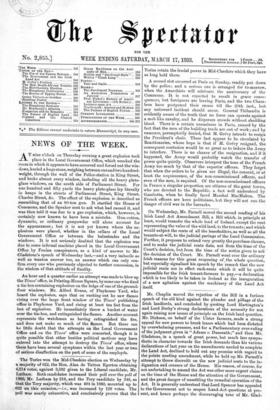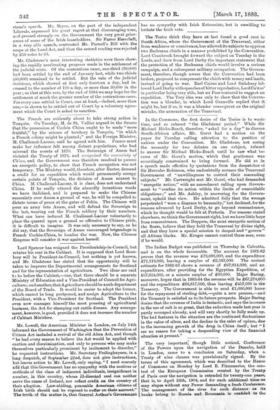Mr. Chaplin moved the rejection of the Bill in a
furious speech of the old kind against the plunder and pillage of the Irish landlords, and concluded by quoting Lord Hartington's and Lord Derby's strong declarations of the necessity for not again raising new issues of principle on the Irish land question. Mr. Dickson, on behalf of the Ulster farmers, made a strong appeal for new powers to break leases which had been dictated by overwhelming pressure, and for a Parliamentary over-ruling of the judgment given in "Adams v. Danseath ;" and then Mr. Gladstone, in a speech of great power, but much less sympa- thetic in character towards the Irish demands than his various declarations of last year on the amendments needed to complete the Land Act, declined to hold out any promise with regard to the points needing amendment, while he held up Mr. Parnell's attempt to throw discredit on the new judicial rents to the in- dignation and censure of the House. His reason, of course, for not undertaking to amend the Act was other more urgent claims on the time of the House and the attention of the Government, and the great danger of unsettling the remedial operation of the Act. It is generally understood that Lord Spencer has appealed to the Government not to reopen Land-Act questions at pre- sent, and hence perhaps the discouraging tone of Mr. Glad- stone's speech. Mr. Bryce, on the part of the independent Liberals, expressed his great regret at that discouraging tone, and pressed strongly on the Government the very great griev- ances of some of the Irish leaseholders. Sir Farrar Herschell, in a very able speech, contrasted Mr. Parnell's Bill with the scope of the Land Act, and then the second reading was rejected by 250 votes to 63.



































